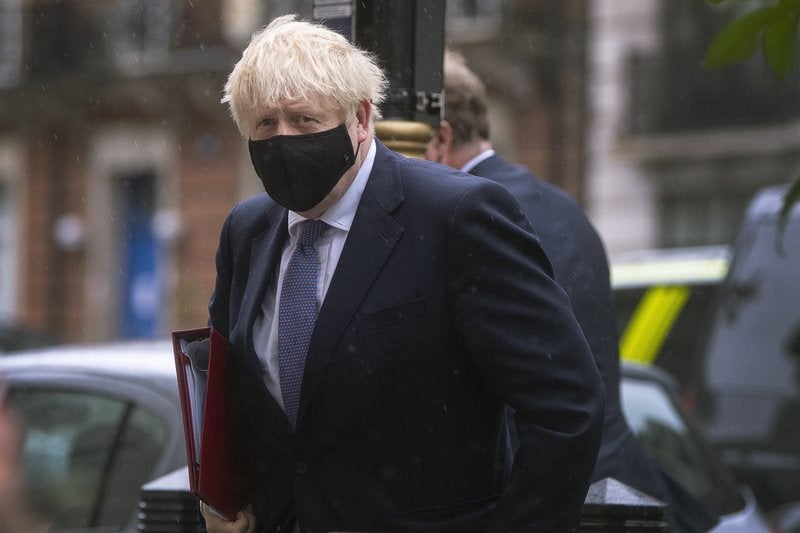Boris Johnson’s blithe optimism and self-conscious witticisms are exactly what we don’t need right now
Editorial: As a response to a national emergency in a country with one of the worst Covid-19 death rates in the world, the prime minister’s flippancy is worse than woeful

Pandemic? What pandemic?
It was entirely understandable, though still bizarre, that the prime minister spent far more time painting a portrait of the sunny, green, wind-powered Britain of the far future than he did the rather more pressing public crisis of today. It was as if the UK already had its world-beating test and trace system, and was serenely exiting the crisis. Perhaps the prime minister has convinced himself of this alternative reality. He has rarely seemed more out of touch.
The businesses going bust, the workers being sacked, the renters being evicted and the students denied an education are not much interested in where they’ll be flying to on the hydrogen-powered machines of the future. Few will be distracted from their current fears by the prime minister’s vista of the lovely cycling holidays and picnics they’ll be organising in the British “wild belt” of the mid-2030s; quiche in the sky, you might say.
Unemployment will double by the time of the next Conservative conference, and the country will probably still be struggling with the economic aftermath of the coronavirus and Brexit. The impact of Covid may well be more permanent and thus more devastating to sectors of the economy than hitherto assumed. Even with a vaccine and a degree of herd immunity – neither guaranteed – the economy will have to undergo significant restructuring. Working from home, shopping online and nervously avoiding mass indoor gatherings are trends that are here to stay.
In terms of confronting the reality of that, there is a stark difference between the gritty realism presented in his speech by the chancellor, Rishi Sunak, and the fantastical boosterism of Boris Johnson. Mr Sunak manages to sound regretful and sombre, even as he tells the public that things will not be as they were. Mr Johnson cannot help himself from sounding flippant, even as he assures the nation that things will return to pre-Covid normal.
Where Mr Johnson believes that Britain can merely press the reset button, Mr Sunak is thinking of a country that will have to move on, and how to deal with the pain. The leader of the Conservative Party even compared the coronavirus to previous attempted “alien invasions” over the past 1,000 years, as if this sub-microscopic organism could be seen off like Philip II of Spain or Adolf Hitler. It is ridiculous.
Even his ambition to fuel every British home and car via wind-generated electricity by 2030 was just so much bluster, a talking point for the public and something novel for the media to splash on. Mr Johnson wishes to make wind power to Britain what oil is to Saudi Arabia. A fine ambition, and there is everything to applaud in millions of “green collar” jobs.
But, as they used to ask of Labour, where will the money come from? Who is to pay for this breakneck speed environmental revolution? Will it be taxpayers or consumers and businesses? Who will own the infrastructure and take the risks? As with nuclear, what will the pricing structure be in the long run? Is it even practical? The few billions committed by the Treasury is certainly not enough to make Britain the greenest nation on Earth.
Much the same financial scrutiny needs to be applied to yet another scheme for the state subsidising home ownership. If Mr Johnson is proposing that the taxpayer guarantees the debts of first-time buyers in return for a tiny 5 per cent deposit during a recession, he had better come clean about the exposure. The risks to the public finances of HM Treasury taking on the negative equity of young homeowners are clear and unacceptable. Still less desirable will be the effect on house prices, artificially inflating them, pushing them once again out of reach and demanding an even bigger state subsidy.
For a party supposedly devoted to the free market, individual responsibility and balancing the nation’s books, a state-fuelled housing boom attached to a one-way bet for first-time buyers is reckless. The British government should leave mortgages to HBOS, Santander, the Nationwide Building Society and others who better understand what they are doing.
At any rate, it is unlikely that Mr Johnson will still be prime minister in 2030, to answer questions about failed policy moonshots. The irony may be that it will have to be a Labour government that has to deal with a decade of mismanagement.
Some adore Mr Johnson’s blithe optimism and self-conscious witticisms, the style and delivery honed in the Oxford Union Society, dashed-off columns in The Spectator and countless Tory rallies and after-dinner speeches. It works well as a pleasant diversion in normal times, especially in front of an audience of boozed-up businesspeople, starry-eyed Brexiteers or cultish Tory activists. As a response to a national emergency in a country with one of the worst Covid death rates in the world, it is worse than woeful; it is an insult.
Join our commenting forum
Join thought-provoking conversations, follow other Independent readers and see their replies
Comments



Bookmark popover
Removed from bookmarks